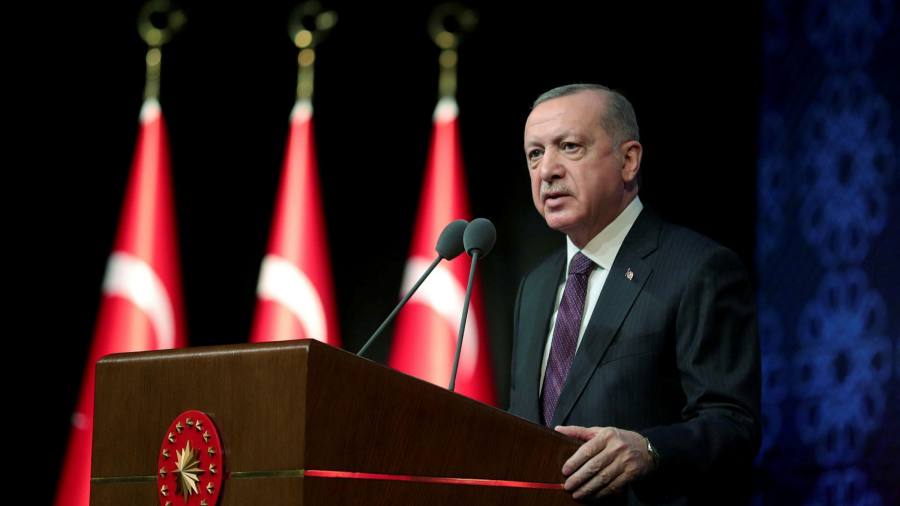[ad_1]
President Recep Tayyip Erdogan pledged to bolster Turkey’s judicial system and protect freedom of expression as he announced government plans to strengthen civil liberties in a country that has faced criticism from its western allies over the erosion of human rights.
In a speech on Tuesday, the president — who has had a fraught relationship with Brussels in recent years — outlined an 11-point “human rights action plan†including a renewed effort to meet EU membership criteria and win visa-free travel to the bloc.
“No one will be deprived of their freedom for expressing criticism or their thoughts,†he told an audience which included EU ambassadors.
Turkey is still formally in talks to join the EU but relations between the two sides have deteriorated as Erdogan has became more authoritarian. The bloc’s leaders will meet this month to review its relationship with Ankara, which has been further strained by a dispute over Turkish drilling in the eastern Mediterranean.
Turkish activists on Tuesday questioned the sincerity of the government’s pledge. Hurrem Sonmez, a lawyer who works on human rights cases, said: “in a country where people are detained for lengthy periods for their political beliefs and activities, few people believe that just preparing a plan
will make a difference. What’s important is action that will change
the current situation.â€
Turkey ranks as the 32nd least-free country on Freedom House’s index of 100 nations, which cites the ruling party’s “contempt for political rights and civil libertiesâ€. Thousands of political activists and journalists have been jailed.
Ankara has ignored orders from the European Court of Human Rights to free Kurdish politician Selahattin Demirtas and Osman Kavala, a civil society activist.
Erdogan, who since Joe Biden’s election as US president has said he wants to “turn a new page†with Washington and Brussels, did not mention their cases on Tuesday. But he said the plan would improve access to speedy and fair trials, narrow the scope for detention and end discrimination based on race, gender, political belief or religion.
“The ultimate objective of this action plan is a new and civilian constitution,†he said. “A new constitution can no longer be postponed amid society’s growing calls and the progress Turkey has made in democratic and economic development.â€
But cautioning against the dangers of too much freedom, the president added: “Watering a thirsty plant is delivering justice, watering a thorny plant would mean oppression.†He said: “We won’t give water to every flower we see.â€
Erdogan also said the reforms would strengthen rule of law and the business climate. He wants to lure back foreign investment that has fled Turkey over concerns about his economic and foreign policies in the wake of a 2016 coup attempt and the ensuing clampdown.Â
“The state will protect and expand freedom of enterprise and work within the framework of free-market principles based on competition,†he said.
Last month Erdogan unexpectedly called for a new Turkish constitution, four years after the charter was amended to transform his office into an executive presidency that concentrated vast powers in his hands, including control of the judiciary.
A new constitution “will belong to everyone,†Erdogan said, and invited all political parties to participate in the drafting process that “will prioritise the national will.â€
Tayip Temel, a lawmaker from the opposition Peoples’ Democratic party (HDP), said he had “little faith that a new constitution wouldn’t just serve to make this government’s power more authoritarianâ€. He said the ruling party and its ultranationalist partners planned to outlaw the HDP, Turkey’s second-largest opposition party, adding, “this speech seeks to camouflage anti-democratic practices and mislead world opinionâ€.
On Tuesday, a senior prosecutor opened an investigation into alleged
links between the HDP and Kurdish militants, which could pave the way
for a legal case for a ban, according to news reports.
[ad_2]
Source link





